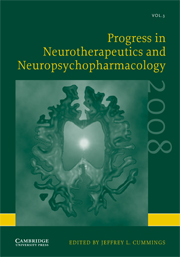Book contents
- Frontmatter
- Contents
- Contributors
- Progress in Neurotherapeutics and Neuropsychopharmacology 2008
- Triflusal versus Aspirin for the Prevention of Stroke
- The Argatroban and tPA Stroke Study
- Use of Selegiline as Monotherapy and in Combination with Levodopa in the Management of Parkinson's Disease: Perspectives from the MONOCOMB Study
- Ropinirole 24-h Prolonged Release in Advanced Parkinson Disease: Review of a Randomized, Double-Blind, Placebo-Controlled Study (EASE PD-Adjunct Study)
- Insulin Resistance Alzheimer's Disease: Pathophysiology and Treatment
- Targeting Amyloid with Tramiprosate in Patients with Mild-to-Moderate Alzheimer Disease
- Intranasal Zolmitriptan Is Effective and Well Tolerated in Acute Cluster Headache: A Randomized Placebo-Controlled Double-Blind Crossover Study
- Optimal Dosing of Immunomodulating Drugs: A Dose-Comparison Study of GA in RRMS
- Tetrathiomolybdate versus Trientine in the Initial Treatment of Neurologic Wilson's Disease
- Randomized Clinical Trials of Pregabalin for Neuropathic Pain: Methods, Results, and Implications
- Effect of Methylphenidate in Patients with Acute Traumatic Brain Injury; a Randomized Clinical Trial
- Improvement in Speeded Cognitive Processing After Anti-epileptic Drug Withdrawal–A Controlled Study in Mono-therapy Patients
- A Randomized-Controlled Trial of Bilateral rTMS for Treatment-Resistant Depression
- Serotonin Related Genes Affect Antidepressant Treatment in Obsessive–Compulsive Disorder
- Night Eating Syndrome and Results from the First Placebo-Controlled Trial of Treatment, with the SSRI Medication, Sertraline: Implications for Clinical Practice
- Modafinil: A Candidate for Pharmacotherapy of Negative Symptoms in Schizophrenia
- New Approaches to Treatment of Schizophrenia by Enhancing N-methyl-D-aspartate Neurotransmission
- Subject Index
- Author Index
Night Eating Syndrome and Results from the First Placebo-Controlled Trial of Treatment, with the SSRI Medication, Sertraline: Implications for Clinical Practice
Published online by Cambridge University Press: 13 May 2010
- Frontmatter
- Contents
- Contributors
- Progress in Neurotherapeutics and Neuropsychopharmacology 2008
- Triflusal versus Aspirin for the Prevention of Stroke
- The Argatroban and tPA Stroke Study
- Use of Selegiline as Monotherapy and in Combination with Levodopa in the Management of Parkinson's Disease: Perspectives from the MONOCOMB Study
- Ropinirole 24-h Prolonged Release in Advanced Parkinson Disease: Review of a Randomized, Double-Blind, Placebo-Controlled Study (EASE PD-Adjunct Study)
- Insulin Resistance Alzheimer's Disease: Pathophysiology and Treatment
- Targeting Amyloid with Tramiprosate in Patients with Mild-to-Moderate Alzheimer Disease
- Intranasal Zolmitriptan Is Effective and Well Tolerated in Acute Cluster Headache: A Randomized Placebo-Controlled Double-Blind Crossover Study
- Optimal Dosing of Immunomodulating Drugs: A Dose-Comparison Study of GA in RRMS
- Tetrathiomolybdate versus Trientine in the Initial Treatment of Neurologic Wilson's Disease
- Randomized Clinical Trials of Pregabalin for Neuropathic Pain: Methods, Results, and Implications
- Effect of Methylphenidate in Patients with Acute Traumatic Brain Injury; a Randomized Clinical Trial
- Improvement in Speeded Cognitive Processing After Anti-epileptic Drug Withdrawal–A Controlled Study in Mono-therapy Patients
- A Randomized-Controlled Trial of Bilateral rTMS for Treatment-Resistant Depression
- Serotonin Related Genes Affect Antidepressant Treatment in Obsessive–Compulsive Disorder
- Night Eating Syndrome and Results from the First Placebo-Controlled Trial of Treatment, with the SSRI Medication, Sertraline: Implications for Clinical Practice
- Modafinil: A Candidate for Pharmacotherapy of Negative Symptoms in Schizophrenia
- New Approaches to Treatment of Schizophrenia by Enhancing N-methyl-D-aspartate Neurotransmission
- Subject Index
- Author Index
Summary
ABSTRACT
Objective: The goal of the study was to assess the efficacy of sertraline in the treatment of the night eating syndrome (NES). Method: Thirty-four outpatients diagnosed with NES were randomly assigned to receive either sertraline (n = 17) or placebo (n = 17) in an 8-week, double-blind, flexible-dose (50–200 mg/day) study. We used the mixed effects linear regression model to analyze change in the primary outcome measure, the Clinical Global Impression of Improvement Scale (CGI-I). Secondary outcomes included changes in the Night Eating Symptom Scale (NESS), the number of nocturnal awakenings and ingestions, total daily calorie intake after the evening meal, Clinical Global Impression of Severity Scale (CGI-S), Quality of Life Enjoyment and Satisfaction Scale (Q-LES), and weight. Results: Sertraline was associated with statistically significantly greater improvements than placebo in the CGI-I scale. As determined by a CGI-I score of ≤ 2 (much or very much improved), 12 subjects in the sertraline group (71%) were classified as responders versus only 3 in the placebo group (18%). There were also significant improvements in the NESS, CGI-S scales, Q-LES, frequency of nocturnal ingestions and awakenings, and calorie intake after supper. Overweight and obese subjects in the sertraline group (n = 14) lost a significant amount of weight by week 8 (mean = −2.9, SD = 3.8 kg) compared to those in the placebo arm (n = 13) (mean = −0.3, SD = 2.7 kg). Conclusions: In this 8-week trial, sertraline was effective in the treatment of NES and was well tolerated.
- Type
- Chapter
- Information
- Progress in Neurotherapeutics and Neuropsychopharmacology , pp. 241 - 258Publisher: Cambridge University PressPrint publication year: 2008
- 1
- Cited by



